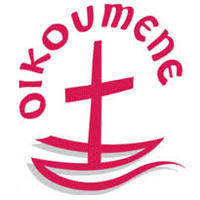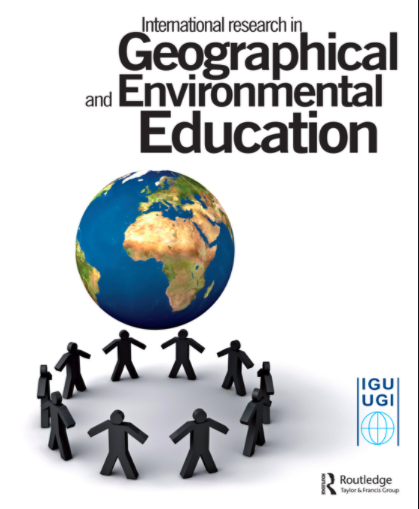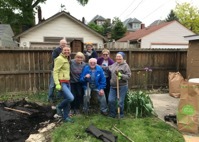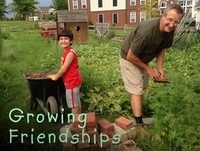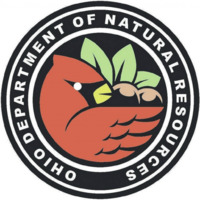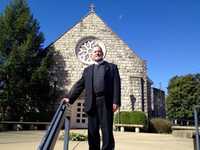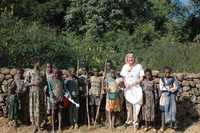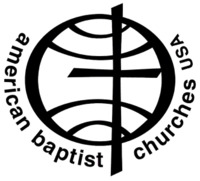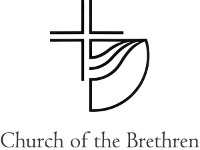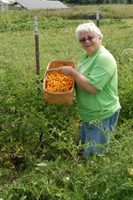Search
36 items
-
Pope Francis and Environmental Leaders Forge Vision for Global Action
Environmental leaders, activists and advocates gathered with Pope Francis for a two-day Vatican-organized conference with hopes to emerge with a shared vision for protecting our planet. The conference was inspired by the third anniversary of the Pope’s encyclical and was attended by political and religious leaders, scientists, economists and heads of civil society organizations. Inspired by the call for unity and action in the encyclical, UN Environment also introduced their Interfaith Rain-forest Initiative at the conference. -
WCC Executive Committee: global biodiversity crisis reaches urgent level
This article from the World Council of Churches discusses the current biodiversity crisis. The majority of land surfaces and ocean areas are significantly modified, and over 85% of the wetlands are gone. The following excerpt notes how this subsequently affects the poor and vulnerable:
"The statement notes that, increasingly, the drive for relentless expansion built into dominant economic systems are endangering the survival of many of God’s creatures. 'Ultimately our significant and adverse impacts on ecology will impact humanity’s own future,' the statement reads. 'Already they are destroying the very basis of sustenance of our income-poor, vulnerable and Indigenous sisters and brothers, who contribute least to the ecological damage for which human beings are collectively responsible.'" -
How do we Communicate Environmental Ethics? Reflections on Environmental Education from a Kuwaiti Perspective
Dr. Khadija al-Naki, an educational researcher, discusses Islamic thought in relation to environmental education. Comparing Islamic teachings with Western environmental ethics, al-Naki opens a conversation on how to develop an environmental curriculum in Islamic education systems. This article leaves the reader questioning the role of education in the environmental movement.
Published in the journal International Research in Geographical and Environmental Education. -
Manifesto for an Ecological Reformation of Christianity
This Manifesto by the World Council of Churches is a call to examine Christian practices that may be harmful to the Earth, humans, and other species. It urges individuals instead to focus on what various “eco-congregations” or “green churches” are doing. The following manifesto excerpt provides a rationale for the need for ecological reformation:
"The need for an ecological reformation of all Christian traditions is of course manifested in different ways in various parts of the world. The pain impulses associated with ecological destruction have been registered especially in those areas that lie on the periphery of current constellations of economic power. The call for an ecological reformation of Christianity has come with particular urgency from Christians in such areas (the Pacific, Africa, Asia, Latin-America) as they are more exposed and vulnerable. This call is echoed by churches which belong to (mainly protestant) countries in the global North which have contributed heavily to the exploitation of natural resources, industrial production and a style of consumption that causes environmental degradation." -
Wanted: Innovative Farmers to Help Slow Algal Bloom on Lake Erie
The Christian Science Monitor has written an article discussing how agricultural nutrients in the Maumee River, Lake Erie’s biggest source of pollution, are reaching record proportions. Most nutrient pollution is caused by large storms, and with climate change, these storms are becoming increasingly more common. The USDA reports that farmers are making headway toward reducing nutrient pollution on a voluntary basis, but many researchers say that these efforts are not sufficient. A recent report suggests additional outreach, an increased focus of conservation dollars, and mandated soil testing.
Wetland restoration – bringing back bits of the Black Swamp— can play a pivotal role in clearing algal bloom in Lake Erie. The Black Swamp Conservancy is currently working on turning 60 acres back into swamp in northwestern Ohio. William Mitsch, a retired Ohio State University professor and wetlands expert, hopes to eventually restore a tenth of the Black Swamp (about 100,000 acres) to provide a substantial cleaning of Lake Erie. -
Interfaith Rainforest Initiative
From the organization's website: "The Interfaith Rainforest Initiative is an international, multi-faith alliance that aims to bring moral urgency and faith-based leadership to global efforts to end tropical deforestation. It is a platform for religious leaders to work hand-in-hand with indigenous peoples, governments, civil society and business on actions that protect rainforests and safeguard those that serve as their guardians." The initiative focuses on raising awareness, mobilizing action, and influencing policy. -
Congregational Profile: St Francis of Assisi parish Creation Care Team, Columbus, OH
When St. Francis of Assisi’s Creation Care Team volunteered to take responsibility for caring for the church’s flower and vegetable gardens in the summer of 2018 it faced a challenge: how to dispose of yard waste in a responsible manner. The parish did not have resources to hire a vendor to appropriately dispose of leaves and garden debris and hauling it away in our private cars while possible would take extra time. The Team members did know though that we did not want to continue to toss the yard waste in the trash, which is what had previously been done.
Luckily a solution was at hand: a new member of our parish and our Creation Care Team—Todd Marti-- serves as one of the “garden stewards” at Upper Arlington Lutheran Church’s community garden at Mill Run. Todd volunteered to haul away the yard waste from St. Francis and add it to the compost bins at the community garden. So St. Francis’ yard waste helps grow food that when harvested feeds hungry families through Neighbors (SON) Ministries’ Hilliard Free Lunch Summer Camp for Kids program, the Hilltop, Mid-Ohio Food Bank, and through Faith Mission-- a win for all involved.
-
Engaged Organizations: Stratford Ecological Center
The Stratford Ecological Center is an organic farm and nature preserve that provides education sessions, tours, and hiking trails to the public. They also offer various workshops and classes on an ongoing basis.
Trinity Catholic Elementary School 4th and 5th graders participation each year in a 5-day environmental camp "Messages of the Earth" at the Stratford Ecological Center. -
Engaged Organizations: Kenyon College Brown Family Environmental Center
The Brown Environmental Center at Kenyon College offers both self-guided and educational sessions that showcase their diverse range of natural habitats that are maintained at the center.
St. Vincent de Paul in Mt. Vernon, Ohio makes annual trips for their K-6 students. -
Engaged Organizations: Black Church Food Security Network
The Black Church Food Security Network strives to provide fresh produce to historically Africa American churches within the Baltimore Metro area. Their popup farm stands provide convenience to the public as they are able to set up during times when congregation members typically gather. Ideally, members will either start their own gardens on site or expand ones that they currently maintain. Often, the farmers or urban growers will offer to lead bible studies and include food security issues as part of the sessions. -
Toledo Grows: Community Supported Agriculture (CSA)
Community Supported Agriculture is run by grassroots organization Toledo Grows. Benefits of being a CSA shareholder include receiving weekly shares of quality, fresh farm products. Shareholders also can choose between a full share (portioned for a family of 3-4 for the week) or a half share (portioned for 1 or 2).
Members support local farmers using sustainable growing methods—no harmful chemicals; receive a variety of vegetables and herbs, including many “staples” such as carrots, lettuce, peppers, onions, etc.—whatever is ready that week; experience new vegetables; and receive recipes and tips on cooking them. -
Profile: Todd Marti
Todd Marti, a parishioner at St. Francis of Assisi Parish in Columbus, serves as a “garden steward” for the community garden located on the grounds of the Upper Arlington Lutheran Church at Mill Run. Todd’s garden stewardship is a clear reflection of his care for creation and his fellow man. Each year vegetables are planted on two-thirds of the 12,500 square feet garden. When the tomatoes, beets, squash, lettuce and other vegetables are harvested they are donated to the Hilliard Free Lunch Summer Camp for Kids, and Mid-Ohio Food Bank partner pantries. On average 10,000 pounds of produce is harvested and donated annually. Over the life of the garden 130,000 plus pounds of produce have been donated. The recipient of the Franklin Park conservatory Growing to Green Gardener of the Year Award in 2012, Todd utilizes innovative gardening practices such as companion planting and sequencing of multiple crops to enhance output. The garden helps preserve God’s creation by composting food waste and coffee grounds from local coffee shops and restaurants. Yard waste is also composed including that generated by St. Francis of Assisi from its flower and vegetable gardens.
When he is not working in the community garden—which he is every Saturday from spring until mid-November--or recruiting volunteers to help with weeding, planting and harvesting, Todd can be found at his day job as an Assistant Attorney General for State of Ohio.
-
Christians and Endangered Species
Throughout time, it has often been difficult to reconcile concepts from both biology and theology. This article focuses on the critical impact of endangered species with regard to various Christian religions. Citing biblical text, especially the story of Noah’s Ark, many religions have deemed the preserving and caring for all living creatures to be of utmost importance. -
Anamchara Faith Community Celebrates Earth Day 2016
This year, the Anamchara Faith Community will be providing an Earth Day celebration in the woods at Bernheim Forest in Bullitt County, Kentucky. The service will include biblical passages that give honor to the importance of trees, with the plan to plant at least one during this time. This service will draw from different faiths and cultures, ranging from the Catholic faith to Native American customs and traditions. -
Trees for the Earth
The Catholic community is joining with the Earth Day Network to help reach the goal of planting 7.8 billion trees by 2020. This would equate to one tree per person on earth. Pope Francis's recent encyclical, Laudato Si, focuses on the importance of trees and their benefits to the environment as well as human kind. -
Tu' B'Shvat: The Green of Judaism
Tu B’Shvat: The Greening of Judaism is a handout from Interfaith Family. It offers a brief overview of Tu B’Shvat and different activities to celebrate the holiday. It also offers examples of how to be caretakers of the earth. To read the entire handout, click below. -
Tu B’Shvat: Trees’ ReBirth Day
The Jewish festival of Tu B’Shvat, also known as the New Year for Trees, celebrates the ReBirthDay of earthly trees and of the sacred and supernal Tree of Life. The celebration begins on January 30th and ends January 31st. It is celebrated with a Seder in which the menu is the fruits and nuts that are given by the trees. As a special aspect of their climate-crisis work, The Shalom Center is inviting people to create a special Trees of Life Fund for reforestation in the US. -
Ethiopia’s Church Forests
The beautiful forests of Ethiopia are rapidly disappearing due to human activity. However, the forests around the Ethiopian churches remain intact and teeming with diverse life. Dr. Margaret D. Lowman, known as Canopy Meg, has teamed up with one of these churches to study and survey the wildlife, mostly insects in the area. The children of the church community are being engaged to become the next generation of stewards in order to ensure that the forests and creatures are preserved. Project leaders also aim to help build walls in order to keep these forest areas more protected from human development. -
Environmental Statement – American Baptist Churches
Environmental problems that exists today have stemmed from humanity’s current and past greed. Science and technology are being abused and threaten to make problems worse, even though they have the power to make things better. American Baptists advocate that we must be stewards of our home and not abuse it if we wish to continue on as a species. In order to fix what humans have caused, we are called to recognize and preserve the earth and natural resources we have. -
Environmental Statement – Church of the Brethren
The Bible is filled with examples that demonstrate our responsibility to care for all creation on our planet. From Genesis to the parables of Jesus, it is explicitly stated that we must be caring stewards of the earth. In order to reverse the damage that humankind has done, the Church of the Brethren is calling its own members and all people to action. In addition, they are also calling upon the government to be more supportive of environmental policies and clean up. -
Environmental Statement – Reformed Church in America
In 1982, the Christian Action Commission of the Reformed Church in America (RCA) released a document titled “Care for the Earth: Theology and Practice.” This was given to General Synod, who then passed several resolutions outlining the Reformed Church in America’s stance on environmental issues. The Action Institute wrote the article below that discusses the resolutions that were passed. -
Engaged Organizations: Saint Kateri Conservation Center
Saint Kateri Conservation Center decribe their various ecological program offerings on their website:
"The Saint Kateri Conservation Center offers a faith-based program to inspire Catholics and others to restore yards, gardens, schools, farms, parks, forests, rivers, and wetlands into healthy habitats for people and wildlife. We do this close to home, where we live and work.
The Saint Kateri Habitat Program encourages individuals, parishes, schools, religious orders, and working landowners to restore their natural homes in a way that praises God and fosters a greater connection between people and nature. " -
Shepherd's Corner volunteer opportunities
Shepherd's Corner offers volunteer opportunities for both individuals and groups as indicated on their website:
"Volunteer With Us
Volunteer opportunities at Shepherd’s Corner are as abundant as the fruits of the earth. We invite individuals and groups to share in our ministry of caring for the land. All sorts of skills are needed or come to learn some new ones. One time visits, work on special projects, or regularly scheduled participation are welcome.
Group Projects
Groups are invited for a half day of service on a Tuesday, Wednesday, Thursday, Friday, or Saturday. We ask for one adult per 10 youth under 18 years.
Individual Volunteers
Come for a weekly or monthly time or fill in as needed. Individuals will need to complete our volunteer application. The application is the last to pages of the preceding link. We will ask individuals for background screening since we often have minors present. Volunteers must be age 13 or older; volunteers for animal chores must be age 18 or older." -
Engaged Organizations: A Rocha International
A Rocha International discuss their mission on their website:
"At A Rocha USA, our mission is to restore both people and places through collaborative, community-based conservation.
We resource Christians to care for creation where they live by building a network of hands-on conservation projects in communities across the nation. Through partnerships with individuals, churches, and community groups, we provide content, curriculum, and a network of support for improving local habitats and increasing biodiversity."


